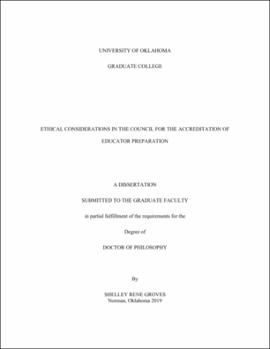| dc.contributor.advisor | Baines, Lawrence | |
| dc.contributor.author | Groves, Shelley | |
| dc.date.accessioned | 2019-06-06T20:28:10Z | |
| dc.date.available | 2019-06-06T20:28:10Z | |
| dc.date.issued | 2019-05 | |
| dc.identifier.uri | https://hdl.handle.net/11244/320326 | |
| dc.description.abstract | The standard of excellence in teacher preparation is accreditation by the Council for the Accreditation of Educator Preparation (CAEP). Millions of dollars, untold hours of human effort, and countless pages of reports go into the process of CAEP accreditation. This conceptual analysis identifies, clarifies, and attempts to better understand the ethical dimensions of CAEP accreditation. Adapting to public education a six-step ethical framework originally developed by Kass (2001) for public health, this study asks the question, is the process of CAEP accreditation ethical? The six-step ethical framework adapted for this study found that the process of CAEP accreditation as it currently exists is not ethical. However, because CAEP accreditation may be required by state law, it may be required. | en_US |
| dc.language | en_US | en_US |
| dc.subject | Accreditation | en_US |
| dc.subject | Teacher preparation | en_US |
| dc.subject | Ethics | en_US |
| dc.title | ETHICAL CONSIDERATIONS IN THE COUNCIL FOR THE ACCREDITATION OF EDUCATOR PREPARATION | en_US |
| dc.contributor.committeeMember | DeBacker, Teresa | |
| dc.contributor.committeeMember | Hill, Crag | |
| dc.contributor.committeeMember | Houser, Neil | |
| dc.contributor.committeeMember | Reeder, Stacy | |
| dc.date.manuscript | 2019-05 | |
| dc.thesis.degree | Ph.D. | en_US |
| ou.group | Jeannine Rainbolt College of Education::Department of Instructional Leadership and Academic Curriculum | en_US |
